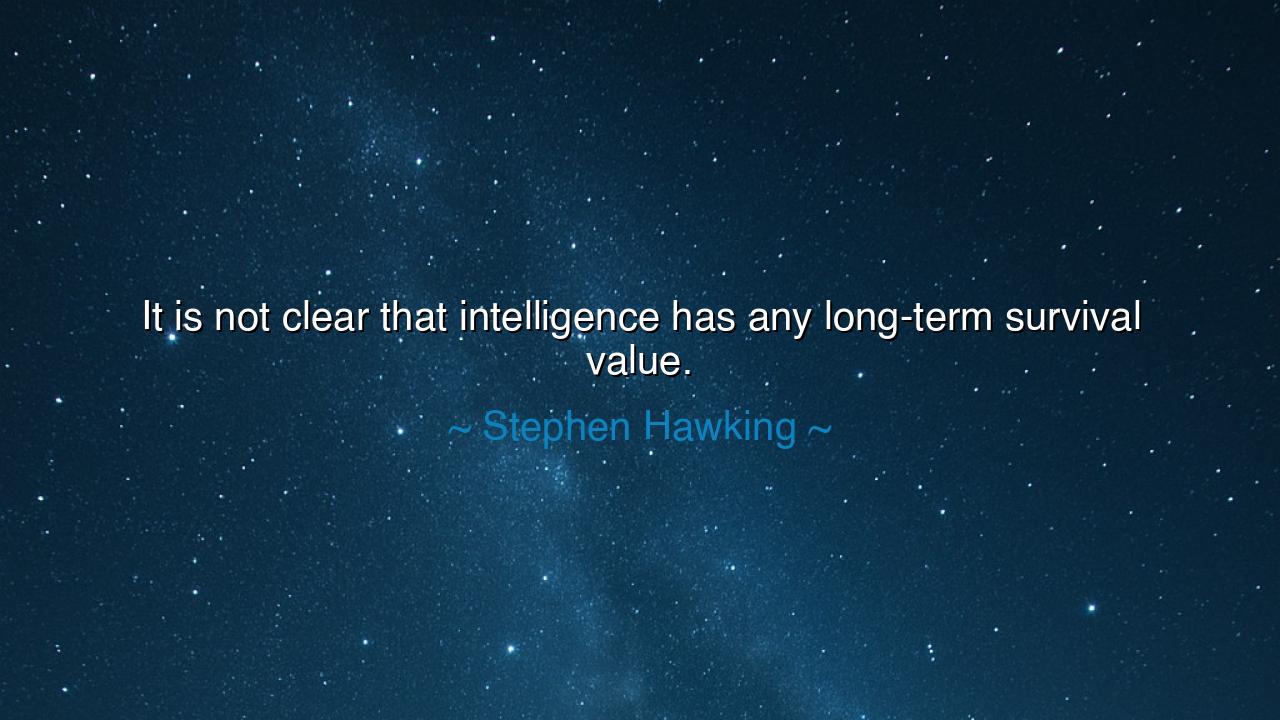
It is not clear that intelligence has any long-term survival






“It is not clear that intelligence has any long-term survival value.” – Stephen Hawking
In these sobering and prophetic words, Stephen Hawking, the cosmic seer of our age, speaks a truth that pierces through the pride of humankind. He warns that intelligence, that gift we so often exalt as the crown of evolution, may not be the key to our survival — it may even be our undoing. For though intelligence has given us mastery over the natural world, it has also armed us with the power to destroy it. With the invention of fire, man conquered darkness; with the splitting of the atom, he learned to unmake creation itself. Hawking, gazing across the abyss of space and time, saw clearly that intellect without wisdom is a sword without a hilt — sharp, dazzling, and fatally dangerous to the one who wields it.
The origin of this reflection lies in Hawking’s lifelong contemplation of humanity’s future among the stars. As a physicist who unraveled the mysteries of black holes and the birth of the cosmos, he saw in the vastness of the universe both the grandeur and the fragility of life. He watched as mankind’s intelligence transformed the Earth — building cities, machines, and empires — yet also threatened to end it through war, pollution, and hubris. His words, then, are not born of despair, but of realism: a warning that evolution does not guarantee endurance. Intelligence has given us the power to shape destiny, but not yet the wisdom to sustain it. Until we learn to temper knowledge with compassion, and power with humility, our brilliance may burn too hot and consume the very world that gave it birth.
Hawking’s statement echoes the wisdom of the ancients, who also knew that knowledge without virtue leads to ruin. The Greek philosopher Socrates taught that wisdom begins in the recognition of one’s ignorance; the myth of Icarus warned of the same truth — that intellect and ambition, ungoverned by prudence, bring about the fall. Icarus, soaring too close to the sun on wings of wax, embodies the modern mind: bold, inventive, but heedless of consequence. His wings melted not because he lacked intelligence, but because he lacked restraint. And so too does Hawking remind us that civilization’s survival depends not on how clever we become, but on how wise we choose to be.
History offers us countless examples of this peril. When humanity split the atom, it unlocked both the energy that lights our cities and the fire that annihilated Hiroshima. The same intelligence that decoded DNA and conquered disease also devised weapons capable of extinction. Even now, as we create machines that learn and think — artificial intelligence — we stand once again at the edge of a precipice. Hawking himself warned that such inventions, if ungoverned by ethics, could evolve beyond our control. Thus, intelligence becomes a paradox: it is both the seed of our progress and the shadow of our destruction. It grants us godlike power, yet tempts us to play God without understanding the divine responsibility that such power demands.
And yet, there is hope in Hawking’s caution. For his words are not a prophecy of doom, but a call to awaken. He does not condemn intelligence; he calls us to elevate it — to align it with empathy, with moral vision, with reverence for life. The survival value of intelligence, he suggests, will only appear when humanity learns to think not merely with its mind, but with its heart. True intelligence must serve harmony, not domination; creation, not destruction. The mind that understands the stars must also understand love, humility, and interconnectedness, or else it becomes a blind engine of ruin.
Consider the example of Albert Einstein, whose genius gave birth to the theory of relativity — a discovery that revolutionized science, yet was later used to fuel the nuclear age. Einstein, horrified by the weaponization of his work, spent his later years preaching peace, declaring that “the release of atomic power has changed everything except our way of thinking.” He understood, as Hawking did, that the salvation of mankind lies not in expanding knowledge, but in transforming consciousness. Only when intelligence becomes compassionate does it earn its right to survive.
So let this teaching be passed down: intelligence alone is not enough. It is a tool — magnificent, yet perilous — and its worth depends on the hand that guides it. Seek not brilliance without balance, nor progress without purpose. Let knowledge be wedded to wisdom, and innovation to integrity. Use your mind to build, not to boast; to protect, not to plunder. For the measure of intelligence is not in what it can create, but in what it can preserve. As Hawking reminds us, survival is not the birthright of the clever — it is the reward of the wise. And if humanity learns this lesson, then intelligence will indeed become not our doom, but the light that leads us safely through the ages.






AAdministratorAdministrator
Welcome, honored guests. Please leave a comment, we will respond soon